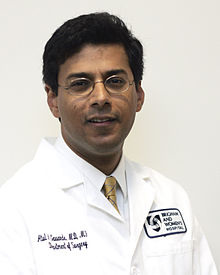 photo credit Wikipedia
photo credit Wikipedia
I wrote about Charles Duhigg’s new book back in March, saying that one of my big disappointments with it was the unfulfilled expectation that he would explain the productivity secrets of Atul Gawande, a surgeon, researcher, writer, family man . . . you name it. The intro of Duhigg’s book is all about Gawande, and he really wants to interview the guy and find out his secrets, but he never does. I was left with a letdown feeling at the end of the book.
Last week Jim and I watched a PBS “Frontline” episode that featured Gawande in his role as a cancer surgeon. (I really like this program, but during concert season I’m always at rehearsal on Tuesday nights. Yes, I know I could watch the episodes online, but that never seems to happen.) Seeing Gawande in action re-ignited my curiosity about him, and this time I decided to do a little research of my own. A 2009 article about him in Harvard Magazine unravels the mystery quite clearly; I’m very puzzled that Duhigg didn’t include this infor-
mation, as it’s so readily available. All that was required was a quick Google search using Gawande’s name and, I believe, the word “productivity.” So how does Gawande get so much done, and how can we do the same?
1. He is absolutely, passionately committed to everything he does. In the “Frontline” episode he is seen sitting on the shore of the Ganges River, where he and his mother have come to scatter his father’s ashes. While he is shown as a willing participant in this process, in this particular segment he is writing in his journal. (Actually, he’s writing in one of those composition books with the black-and-white covers, so well-remembered by all of us from school. He has stacks of them; apparently these books constitute his main writing tool. Sigh. When I think of the hours I’ve spent trying to conquer Scrivener!) Desire drives accomplishment. He works so hard because he loves his work.
2. He doesn’t do everything all at once; basically, each day in the workweek is devoted to a different aspect of his life, even though he does, as noted above, take advantage of small segments of time no matter where he is or what he’s doing. There is, for instance, a sequence in the program where he has to wait a few minutes for the results of a biopsy in the midst of an operation, so he goes into another room and catches up on some e-mails. (I was reminded of a scene in the book A Few Second of Panic about a year in the life of the Denver Broncos; Jason Elam, the kicker, would use his downtime during practices to get his Greek homework done for seminary.) But, on the whole, he concentrates on one activity at a time. So, for instance, he does surgery on Thursdays. He does 250 operations a year; that sounds like a lot, and it is. But there are 52 Thursdays in a year, so he’s doing about five per week. Since he does them back-to-back, there are economies of scale involved. He’s not going back and forth to the hospital. (Of course, every single operation involves followup.) I think this concentration principle is a secret of success for lots of productive people; Lindsay Ostrom, the phenomenon behind the incredibly successful cooking blog Pinch of Yum, says that she has a hard time with getting up in the morning and thinking, “Today I have to develop recipes, and take pictures, and go grocery shopping, and write posts.” She tries to concentrate on one area per day.
3. He doesn’t let time slip through the cracks. He’s invariably on time–not early, not late, on time–and rarely sticks around to chit-chat afterwards. On the other hand, if a conversation, an interview, an appearance, is important to him, then he makes time for it. And he’s on time for it.
4. He has staff. And his wife is full-time stay-at-home mom (or was at least at the time of the article). This is not to disparage either Gawande or his wife. It is just a fact. He could not possibly do all he does if he didn’t have support, both at home and at work. If he had to do the grocery shopping, well, something would have to give. (I’m reminded here of another fabulous oncologist, the doctor who treated our son Gideon during his bout with cancer, Robert Rifkin. There’s a full-time staffer in his practice who keeps track of his and two other doctors’ schedules. What if he had to do this himself? Division of labor makes the whole thing possible. And are we glad that Dr. Rifkin wasn’t having to be the one riffling through the appointment book so that he could devote his gigantic capabilities to treating our son!)
So no magic formulas are necessary for phenomenal success. Just unrelenting hard work, priority setting, and support. There are some practical applications here to the lives of us more ordinary mortals. For me, one lesson I always need to remember is that I don’t need to do everything myself; sometimes I’m in the midst of something, feeling totally overwhelmed, and then remember, ‘Hey, I can ask ________________ to _______________.’ That second pair of hands makes all the difference. And it’s always helpful to remember the old proverb “A change is as good as a rest.” So if I take a break I don’t have to just flop. I can go out and pull a few weeds, then come back in and hit the blog post again. Whoops! My timer just rang. I’m supposed to take a five-minute break. Weeds, here I come!
Good to know what Gawande’s secrets to productivity were. I was wondering myself when I read Duhigg’s book.